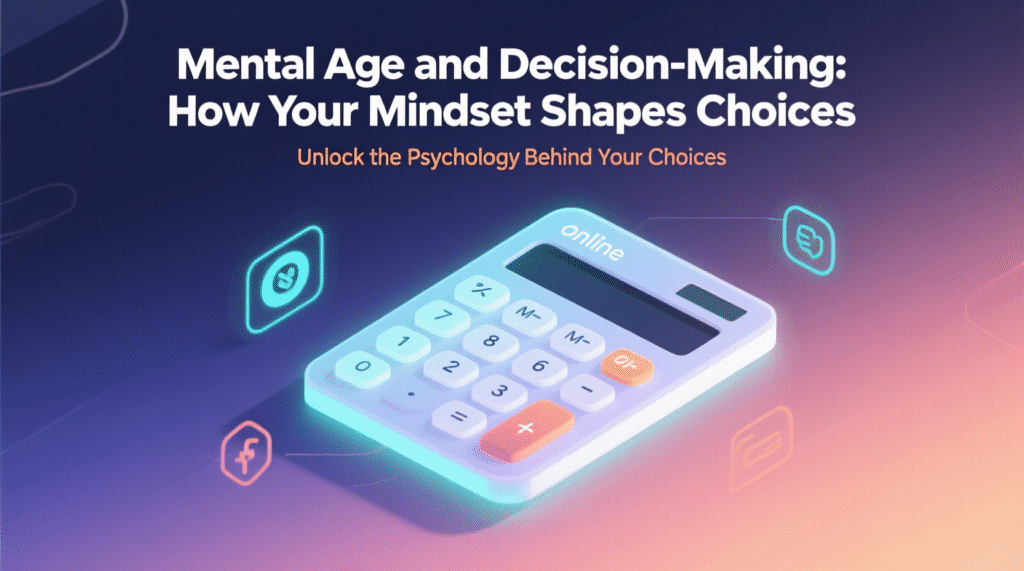
Your mental age doesn’t always match the number of years you’ve lived. Some people feel younger than their real age, while others act far more mature. This difference can shape the way you make decisions every single day—from what risks you take to how you handle challenges.
What Is Mental Age?
Mental age reflects your level of emotional maturity, mindset, and perspective on life.
- A youthful mental age often shows up as spontaneity, curiosity, and a willingness to take risks.
- A mature mental age leans toward caution, patience, and long-term thinking.
It’s not about intelligence or IQ—it’s about how you see the world and respond to it.
Explore how does mental age affect personality to see how thinking style shapes behavior.
How Mental Age Impacts Decision-Making
1. Risk Appetite
- Younger mental age → more adventurous, willing to leap before looking.
- Older mental age → cautious, prefers analyzing risks before acting.
2. Emotional Control
- Youthful mindset reacts quickly, sometimes based on mood.
- Mature mindset pauses, processes emotions, then decides.
3. Problem-Solving Style
- Younger profile favors creativity and fast decisions, even if impulsive.
- Older profile tends to be methodical and strategic.
4. Social and Relationship Choices
- A playful mindset may chase fun and spontaneity in relationships.
- A wiser mindset seeks deeper bonds and long-term stability.
Take our accurate mental age test to find out how your mindset influences everyday decisions.
Mental Age in Action: Everyday Scenarios
- Career decisions:
- Youthful mindset → jumps into new jobs for excitement.
- Mature mindset → considers growth, security, and future stability.
- Financial decisions:
- Younger profile → spends freely or tries high-risk investments.
- Older profile → saves, budgets, and prefers lower risk.
- Conflict resolution:
- Youthful mindset → reacts quickly, sometimes emotionally.
- Mature mindset → weighs consequences and looks for compromise.
Visit improvement guide to develop stronger decision-making skills through mental growth.
Balancing Youthful and Mature Decision Styles
Neither a younger nor older mental age is “better.” Each has strengths:
- Younger mental age: boldness, adaptability, creativity.
- Older mental age: foresight, patience, emotional balance.
The best outcomes often come from blending both—staying open to new experiences while applying wisdom when stakes are high.
Compare how people reason at different stages in mental age vs real age.
FAQs About Mental Age and Decisions
Does a younger mental age mean poor decisions?
Not at all. It can encourage fresh, creative thinking, though it may lack caution.
Can your mental age change over time?
Yes. Life experiences, challenges, and personal growth can shift your decision-making style.
Which mental age is “best” for success?
Both matter. Risk-taking sparks growth, while maturity builds stability.
How can I find out my mental age?
You can take a Mental Age Calculator to see if your mindset feels younger, older, or in sync with your real age.
Explore the science behind decision patterns in psychological maturity test.
Final Thoughts
Your mental age influences how you make choices—whether you leap, pause, or carefully plan. By understanding where your mindset falls, you can make decisions that balance creativity with wisdom.
- Your choices are often a reflection of how you act daily based on your maturity level.
- It is important to see if your mental age vs real age aligns when making future plans.
- Poor decision-making can sometimes impact your relationships with those closest to you.
- Distinguishing between mental age and emotional age helps clarify why you react the way you do.
- You might wonder if this is the same as IQ when analyzing your logical reasoning skills.
- Before judging your own choices, you can find out what your mental age is to establish a baseline.
- Skeptics often question how accurate the test is regarding behavioral analysis.